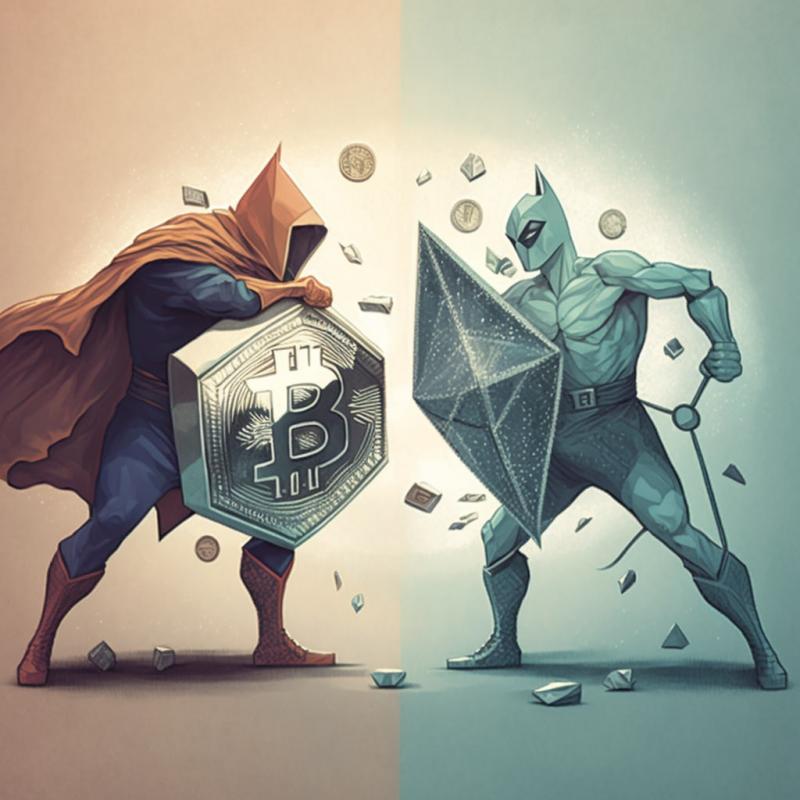Bitcoin vs Ethereum: What are the key differences?
2009 is truly a revolutionary year in the crypto space. This is primarily because it was the birth year of Bitcoin (a digital currency that competes with fiat money). As you all know, Bitcoin has done more than just create a virtual asset. He helped technological innovators realize the idea of blockchain technology. Using the same technology, Ethereum, an application development platform, emerged in 2014. Fast forward to 2021, there are hundreds of cryptocurrencies on the market, with Bitcoin and Ethereum topping the crypto asset chart. But, which of these cryptocurrencies is a good bet in 2021?
Ethereum (or, technically speaking, Ethereum – Ethereum is the blockchain that the cryptocurrency is based on. The term Ethereum is often used nonetheless) could very well be the best cryptocurrency to invest in 2021 based on its recent release of the Ethereum 2.0 Phase 0 update At the same time, Bitcoin remains a vital investment channel due to its unshakable number one rank in the crypto industry and growing adoption among businesses/regulators.
In this article, you will take a look at the classic Ethereum vs Bitcoin comparison through the following points:
What is Bitcoin (BTC)?
Bitcoin is a cryptocurrency or digital currency that facilitates the peer-to-peer transfer of value through a decentralized network. At the same time, every transaction is registered on the Bitcoin blockchain network. As well as the first unregulated digital currency to gain global recognition.
Bitcoin came about when Satoshi Nakamoto, a person or group of people, published his white paper and then released the genesis block in 2009. While the network can have an unlimited supply of cryptocurrencies, the supply of bitcoin is limited. There are only 21 million BTC that can ever be mined, ensuring that their value will continue to rise as the supply decreases.
The main purpose of Bitcoin was to create a means of transferring value digitally without a central authority.
What is Ethereum?
Ethereum Coin (ETH) Ethereum is a global open source platform for decentralized applications.
Although it is quite common to find similarities between Bitcoin and Ethereum, this is hardly the case. Ethereum positions itself as an open source platform built to build decentralized applications. It not only serves as a store of value, but also allows you to create real applications on the Ethereum network.
Vitalik Buterin and his team proposed the idea of Ethereum in 2014 and launched the Ethereum network in 2015. Ethereum has some significant differences compared to Bitcoin, especially the ability to write smart contracts (self-executing code) and build decentralized applications (dApps) on the Ethereum blockchain.
Ethereum is already on its way to upgrading to Ethereum 2.0, making some significant changes that will allow the Ethereum network to become scalable, fast and efficient in the future.
As a rule, Ethereum, along with all cryptocurrencies except Bitcoin, is also an altcoin. Some of the most popular altcoins by market capitalization are: Ethereum XRP Pegging Litecoin Chain link Cardano
What revolves around Bitcoin and Ethereum?
Understanding current events and the development of both of these cryptocurrencies gives a clear idea of the project's prospects. And in general, to help you make the best analysis to support your future trading strategies.
Bitcoin Upcoming Projects
Bitcoin is halving:
This is one of the most significant events in the history of the crypto space. But what is the halving of bitcoin?
Bitcoin halving is the principle of halving the block reward after every 210,000 bitcoin blocks are mined. And the halving happens every four years. Whereas the last halving of Bitcoin occurred on May 11, 2020, reducing the block reward to 6.25 BTC from 12.50 BTC previously. It is believed that the last bitcoin will be mined by 2140.
According to the bitcoin algorithm, there will be a total of 33 halvings after which the block reward will reach less than 1 satoshi. Most of Bitcoin's cuts are followed by BTC price volatility, but its third cut was relatively stable.
Ethereum projects and events
Ethereum 2.0 Update Phase 0: Ethereum is undergoing some significant updates to increase its utility and scalability for future application development. Ethereum 2.0 is a phased update to the Ethereum ecosystem, including the beacon chain, shard chains, and docking.
The main update concerns the transition from Ethereum's resource-intensive proof-of-work (PoW) consensus algorithm to proof-of-stake (PoS). In the first phase of its upgrade, a chain of beacons was deployed, which led to the emergence of PoS in the Ethereum ecosystem.
The main purpose of the Beacon Chain is to coordinate the Ethereum network, which consists of shards and stakers. The beacon chain is essential for the second phase of the Ethereum 2.0 upgrade as it will completely replace the main Ethereum network. in future.
Chainlink Smart Contract Collaboration
Chainlink is an Oracle network and has quickly become a popular way for smart contracts to interact with external data. The startup is already partnering with some of the top tech companies, including Google, to power future developments. Chainlink has announced support for Ethereum infrastructure projects, indicating a major future collaboration.
From an Ethereum perspective, this collaboration will increase the utility of Ethereum smart contracts. Applications using Ethereum will have access to trusted and secure data sources on-chain. At the same time, blockchain networks can continuously interact with other blockchains.
Key Considerations for Investors in Bitcoin and Ethereum
As a crypto enthusiast and investor, it is vital to understand the qualities and challenges inherent in various crypto assets, including Bitcoin and Ethereum.
Scalability and Development
For any crypto asset or blockchain platform to be widely accepted, the ability to scale quickly is not only important, but also detrimental to its further adoption.
Bitcoin dominates the cryptocurrency industry due to its net market cap, but the Bitcoin blockchain has significant scalability issues. On the contrary, Ethereum has solved some of the problems of Bitcoin, but it has its own limitations.
Some of the scalability issues in Bitcoin and Ethereum:
- Slow block formation
Bitcoin and Ethereum rely on a POW consensus algorithm that limits the speed of the network. Bitcoin takes about 10 minutes to generate or mine one block. Whereas, Ethereum takes only 10 to 19 seconds, which is faster than bitcoin, but still nowhere close to centralized systems processing thousands of transactions per second. While the Ethereum 2.0 upgrades are supposed to increase the number of transactions per second (TPS) to 100,000 TPS.
- Poor response time or negotiation delay
Cryptocurrencies have greatly improved the approval of transactions or transfers. What is the bottom line? The transaction is approved in a couple of minutes, not a few days. However, they are not close to matching their instantly responsive centralized counterparts such as Visa or Mastercard. Simultaneously, if other miners do not approve the block, transactions must be included in another block for confirmation (verification).
- Growth in fees
Miners receive block rewards for validating transactions in both Ethereum and Bitcoin. Due to the rising cost of computing power and the complexity of blocks, miners will prefer transactions with higher fees, which will lead to an increase in average transaction fees.
Having carefully examined the scalability issues of Bitcoin and Ethereum, it is important to highlight the current developments in these cryptocurrencies. Bitcoin is limited in terms of its utility and block size, with little room for further development.
Ethereum, by contrast, is rolling out a series of upgrades to increase its utility for enterprise-grade applications. Ethereum 2.0 is already in the process of launching the beacon chain.
The ongoing development of Ethereum puts it one step ahead of Bitcoin, especially in terms of future growth and adoption prospects.
- Acceptance and stability
Cryptocurrencies have come a long way since their humble beginnings ten years ago. The initial response from regulators around the world was to ban crypto, with most governments taking strong regulatory action to ban both crypto and fundraising events (ICOs). Simultaneously, a small group of regions embraced the crypto revolution with open arms, thereby becoming the hotspot for most crypto assets.
Fast forward to the present where bitcoin and Ethereum are witnessing a growing level of acceptance or acceptance around the world. As more financial institutions gear up for blockchain-based services, cryptocurrencies are likely to see the same acceptance.
When it comes to stability, the cryptocurrency markets are notorious for their volatility. Bitcoin itself has witnessed a quadruple price jump in 2020. Ethereum has seen similar sentiment throughout the year. Investors looking for stability should invest in crypto seriously.
- Market capitalization
Cryptocurrencies are among the investments that have performed exceptionally well in 2020 and have continued to do so in 2021. The prices of both Bitcoin and Ethereum increased 10 times between March 2020 and March 2021. The total market capitalization of cryptocurrencies at the time of writing this post (March 2021) was $1.68 trillion.
Market capitalization of some popular cryptocurrencies at the time of writing: Bitcoin: $1.05 billion Ethereum: $189 billion Tether: $40 billion Cardano: $36 billion Litecoin: $12 billion.
Purpose of Crypto (Ethereum and Bitcoin)
Cryptocurrencies are created with several goals in mind. One of the theories surrounding the origin of Bitcoin in 2009 was the creation of an electronic money system that is not affected by recessions or market crashes.
However, cryptocurrencies have come to serve multiple purposes. Bitcoin and Ethereum are proven stores of value. These crypto assets have redefined international transfers, transfer fees and created a truly trusted environment (Ethereum) for companies or individuals to conduct business. In terms of investment, cryptocurrencies have grown at unprecedented levels over the past couple of years.
Long term or short term investments
When it comes to investing in Bitcoin and Ethereum, there are two popular concepts, one is to invest in the short term and benefit from price movements, and the other is to hold crypto for the long term (HODL).
It is critical to understand both short-term and long-term investment approaches.
The approach to short-term investing focuses on price movements in Bitcoin and Ethereum. This involves regular monitoring of price trends. The key is to enter at low prices, hold the crypto for a short period, and then sell it for a profit.
On the other hand, a long-term investment approach takes into account the growth potential of a crypto asset, including factors such as current development, regulatory guidelines, and competition.
When comparing Ethereum to Bitcoin for investment, it is important to understand the long-term upside potential of these currencies. Bitcoin and Ethereum are potentially the best long-term investment choices. This is because despite being the largest cryptocurrency by market size, Bitcoin is still the first volume-limited cryptocurrency. This means that once all BTC has been mined, the value of your bitcoin will generally rise.
Bitcoin vs Ethereum: Similarities
For investors seeking to better understand Bitcoin and Ethereum, it is crucial to understand the similarities between these cryptocurrencies. Some of the similarities between Ethereum and Bitcoin are: Cryptocurrencies: Both Ethereum and Bitcoin are cryptocurrencies, which means they facilitate instant transfers, store value, and incur reasonable transaction costs. Uses Proof of Work: Bitcoin, like Ethereum 1.0, uses the PoW consensus mechanism. Ethereum has launched an update that involves moving to a Confirmation of Stake (PoS) consensus mechanism. Built using blockchain technology: Each of these cryptocurrencies uses blockchain technology. They are safe, secure, encrypted and provide global coverage.
Bitcoin vs Ethereum: Differences
Of course they are not identical. This means that the goal is different, despite the similar concept and logic behind the cryptocurrency.
- Supply of coins
Bitcoin: The total supply of Bitcoin is $21 million. Ethereum: Currently, Ethereum has no supply cap or monetary policy. However, the annual supply is 18 million.
- Mining
Bitcoin: Bitcoin mining uses the PoW consensus mechanism. The first miner to solve the math block puzzle will be rewarded with BTC. Ethereum: Ethereum 2.0 is moving from PoW to PoS. This will significantly reduce the need for computing resources and power consumption.
- Fees
Bitcoin: Bitcoin transaction fees vary depending on the size of the transaction, network congestion, and the Bitcoin exchange rate. You can expect to spend between 1 and 10 Satoshi per transaction byte. ($4,229 per YCharts transaction) Ethereum: Same prices apply to Ethereum transactions. The average amount of ETH gas required for transactions is 21,000 liters of gas. ($3,249 per transaction according to YCharts)
- Transaction speed
Bitcoin: The speed of transactions depends on various factors, but Bitcoin takes 10 minutes to mine a new block. Research shows that the average transaction time in 2019 will be 60 minutes. Ethereum: The same principles apply to Ethereum transactions. Practically, it will take 10 to 20 seconds to mine a new Ethereum block, but research shows that the average transaction time in 2019 will be 6 minutes.
- Final goal
Bitcoin: The ultimate purpose of Bitcoin is to serve as an electronic currency or store of value. It is built with the intention of replacing fiat currency. Ethereum: Ethereum is designed as an application development platform (dApps). It aims to create a decentralized network for the development and execution of various applications.
- Price difference
Bitcoin: At the time of writing, the average market price of Bitcoin is $53,804. Its all-time high was reached on March 13, 2021 at $61,556. Ethereum: At the time of writing, the average market price of Ethereum at the time of writing this post is $1,639. Its all-time high was reached in February 2021 when it topped $2,000 for the first time.
Is Ethereum a better investment than Bitcoin?
Given recent developments in Ethereum and a clear strategy for further upgrades, this puts it in a better position than Bitcoin. Ethereum is more versatile, flexible and has better technologies that can be applied in the real world. With the upgrade of Ethereum 2.0 towards PoS, this will further increase the resilience of the ecosystem due to lower computing power requirements. At the same time, Ethereum, thanks to various collaborations, will continue to grow as a favorable destination for more technology startups.
Bitcoin, on the other hand, lags behind in terms of innovation. However, its market capitalization and growing recognition make it a promising investment for the future. But volatility may be why bitcoin is on the rise. Maybe it's due to inflation that has increased the public's interest in the accumulation of value, the lack of rewards for bitcoin mining, or the maturity of digital assets, calling bitcoin an investment haven is perhaps a little over the top.
After analyzing the various developments and qualities of these cryptocurrencies, Ethereum will be the best long-term investment. Although bitcoin is not too far off the charts. When considering a better investment, it's best to first define your expectations and goal.
What is the future of Ethereum and Bitcoin in 2022?
The current global crisis has prompted a revaluation of both Ethereum and Bitcoin. This year (2021) has seen their prices rise multiple times, but as vaccines are rolled out and businesses return to business as usual, investors may move away from traditional investments.
However, the future of Ethereum and Bitcoin is crowded from an investment standpoint. Ethereum in particular is likely to witness continuous growth in 2022 and beyond.
Investors looking for long-term positions in Ethereum may find the right time to enter the markets as its prices will rise with more upgrades. Bitcoin is already on the rise, but there is a lot of uncertainty and a lack of solid foundations for future price increases.
Final words
Cryptocurrencies are no longer an alternative investment. An increasing number of investors are choosing digital currencies. A significant push is coming from institutional investors who are unwilling to miss an opportunity for higher growth.
The trick for retail investors is to understand the risk of cryptocurrency trading and allocate financial resources accordingly. A small impact on cryptocurrencies makes sense at the moment.





